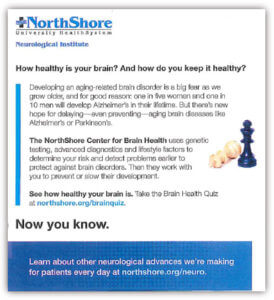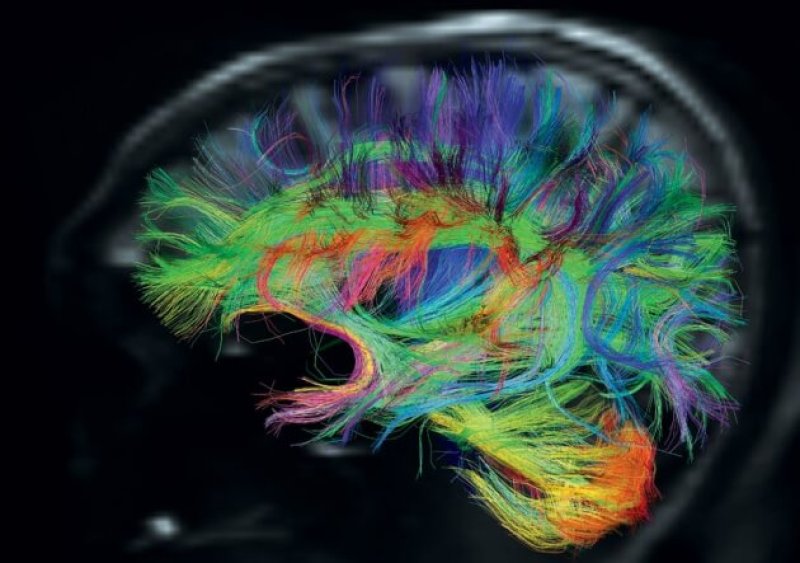There is a memorable episode in the now-classic sitcom Scrubs in which the conniving Dr. Kelso unveils a plan to peddle useless “full body scans” as a new revenue stream for the perpetually cash-strapped Sacred Heart Hospital. The irascible but ultimately patient-protecting Dr. Cox objects loudly. “I think showing perfectly healthy people every harmless imperfection in their body just to scare them into taking invasive and often pointless tests is an unholy sin,” he says. Undeterred, Kelso launches an advertising campaign that promotes the scans in a tear-jerking television commercial and a billboard screaming “YOU may already be DYING.”
Alarmist medical advertising is pretty funny on television, but it can be far more troubling in real life. Although I’ve never been alerted to impending death, I recently received an advertisement from my own trusted health care provider warning that I may have Alzheimer’s disease, although I have no known symptoms and no complaints.
As long-time patients at NorthShore University Health System, which is affiliated with the University of Chicago, my wife and I received two solicitations from its Center for Brain Health touting the development of “ways to slow brain aging and even prevent the onset of Alzheimer’s.” According to the ads, which arrived in both postcard and email form, there is “new hope for delaying — even preventing — aging brain diseases” through “genetic testing, advanced diagnostics, and lifestyle factors.”
 The first step, the ads urged, is to “determine your risk” by taking the online “Brain Health Quiz.”
The first step, the ads urged, is to “determine your risk” by taking the online “Brain Health Quiz.”
The ads came by postcard and email. They encouraged me to take the Center’s “Brain Health Quiz.”
The test has 23 yes-or-no questions about health and lifestyle. Some of them seem obvious (Is there a family history of Alzheimer’s? Have you had a stroke?), and some are much less intuitive (Did you complete less than 12 years of school? Does your diet include white bread every day?).
A final question asks, “Are you worried about your brain health?”
I took the test multiple times, checking only a few factors each time, and I always got the same result, in bright red letters: “Based on your answers, you may have an increased risk,” followed by instructions for arranging a consultation “with a brain health expert.” I once answered “No” to every single question except the last one, indicating only that I worried about my brain health. Nonetheless, I was still evidently facing an “increased risk” of brain disease and therefore in need of consultation. (Selecting “No” for all questions, including the final one about worrying, is apparently the only combination that generates an alternate response from the quiz: “Looks like you have a healthy brain.”)
This struck me as problematic at best. The American Medical Association’s Code of Ethics prohibits advertising that is “misleading” or creates “unjustified medical expectations,” and it requires claims to be “factually supportable.” The Brain Health Quiz, as I discovered, is almost guaranteed to generate a 100 percent hit rate, even for people without any of the objective risk factors. It purports to be making individualized assessments through meaningful screening, but it ends up pushing consultations for nearly everyone. After all, why take the quiz if you aren’t already concerned?
 Dr. John Swartzberg, an emeritus professor of medicine and public health at the University of California, Berkeley, had the same reaction. Although he believed that patients would receive good advice at the Center, he called the ad deceptive and definitely “skating on the edge.” Dr. Jon Merz, who teaches bioethics and law at the University of Pennsylvania, shared a similar observation. “The quiz is misleading at best,” he said, “and worry in itself should not be a risk factor for dementia.”
Dr. John Swartzberg, an emeritus professor of medicine and public health at the University of California, Berkeley, had the same reaction. Although he believed that patients would receive good advice at the Center, he called the ad deceptive and definitely “skating on the edge.” Dr. Jon Merz, who teaches bioethics and law at the University of Pennsylvania, shared a similar observation. “The quiz is misleading at best,” he said, “and worry in itself should not be a risk factor for dementia.”
The director of the Center for Brain Health, Dr. Demetrius Maraganore, did not agree when I sent him a long email outlining my unease about the quiz. Virtually everyone is told they are at risk, I pointed out, based only on the anxiety generated by the advertisement itself. I asked if he approved the quiz before it was distributed, and whether he authorized its use to obtain patients for the Center’s practice.
“In regards to the Brain Health Quiz,” Maraganore replied, “all of the items listed, if answered ‘yes,’ represent the potential for cognitive impairment or other aging brain disorders. Hence one ‘yes’ triggers the prompt to contact Center for Brain Health for more information, as the risk stratification is very complex and multi-factorial.”
I showed Maraganore’s answer to Dr. David Orentlicher, a professor of medical ethics and health law at the University of Nevada Las Vegas, who called the quiz “a dubious practice” because “screening a low-risk population with diagnostic testing leads to many more false-positive test results than true positive results.” Thus, he explained, “the Center will be subjecting many patients to unnecessary testing that could lead to further unnecessary testing, not to mention unwarranted anxiety.”
So who is going to pay for all that testing? According to the Center’s FAQ, “The initial office visit and routine laboratory assessments are typically covered by insurance (preventive health). Other services may be covered depending on your plan.” That is probably reassuring to most potential patients, unless they realize that unnecessary testing drives rising insurance premiums across the board. In any case, it turns out that many of the Center’s services may not be covered, including “elective brain imaging,” but no worries because the Center “will always inform you of potential out-of-pocket costs before moving forward.”
The U.S. Preventive Services Task Force, an independent, volunteer panel of national experts that makes best-practice recommendations for clinical services such as disease screening, has found “inadequate direct evidence on the benefits of screening for cognitive impairment,” even among older adults, and therefore does not currently recommend routine testing, much less brain imaging. The Alzheimer’s Association website recommends check-ups for those with any of “Ten Warning Signs,” none of which overlap with the Brain Health Quiz (nor do they mention simply worrying about the disease).
Patients at the Center for Brain Health, however, are asked to return for annual evaluations. According to the FAQ, “A regular review of your changing risk factors over time and close surveillance of your brain’s health and the effects of your treatments are an important part of maintaining healthy cognitive function throughout your life.”
I asked Maraganore whether the repeated visits were part of a clinical study — which would have implications for patient consent, Institutional Review Board authorization, and recruitment methods — but he did not answer directly. He did send me an article about the Center, which says “we are biobanking DNAs from consenting subjects, genotyping the samples for 1 million genomic markers, and associating the genotypes with electronically captured clinical data.”
The fictional Sacred Heart Hospital eventually stopped pitching full body scans, but NorthShore University Health is standing by its ad.
I don’t doubt the importance of the Center’s research mission, or the caring intentions of Maraganore and his colleagues, but subsequent consent to biobanking does not excuse using the Brain Health Quiz to solicit patients in the first place. If the Center is conducting a research study, the subjects should be enlisted openly, not recruited by overstressing risk factors and inducing anxiety. Nor should they have to pay, with or without insurance, for visits and brain scans when an underlying purpose is to build up the researchers’ data bank.
The fictional Sacred Heart Hospital eventually stopped pitching full body scans, but NorthShore University Health is standing by its ad. Maraganore told me that the Brain Health Quiz was “vetted” by a community advisory board that includes “healthcare providers, civic leaders, representatives from the Alzheimer’s Association, and even a faculty professor from Northwestern with a PhD in public health.” He also said that the quiz is used as a “survey when patients check in to the Center for Brain Health, as a patient-entered questionnaire during the clinical evaluation process.”
There is a world of difference, however, between using a questionnaire to take the histories of actual patients and using an anxiety-provoking quiz to drum up business from new ones, so I wanted to ask the community advisory board members whether they realized that they were approving advertising material rather than an in-house survey. The Center for Brain Health, however, did not respond to my request for their names.
My wife and I are in our late 60s, so we are naturally concerned about Alzheimer’s and related diseases. We therefore expect to get objective information from our medical providers, even in marketing material. The physicians at the Center for Brain Health are experts in cognitive impairment research, but their quiz is the wrong way to round up patients. If they put their minds to it, a bunch of brainy people can surely come up with something a lot less sketchy.
Steven Lubet is the Edna B. and Ednyfed H. Williams Memorial Professor of Law at Northwestern University’s Pritzker School of Law.
This story originally appeared at Undark Magazine under the headline Is a Dubious ‘Brain Health Quiz’ Stoking Alzheimer’s Anxiety to Lure Patients? It has been republished here with permission.































